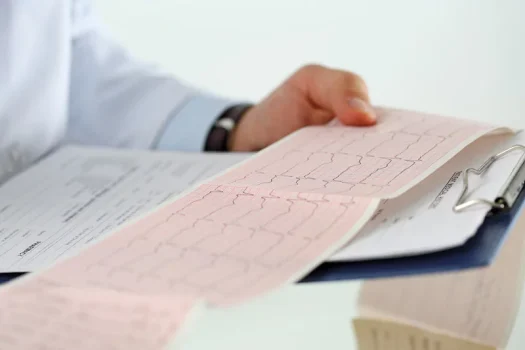Also known as dysrhythmia, arrhythmia is a heart condition wherein the heart experiences abnormalities or irregularities in the heartbeat. Depending on the type of arrhythmia you have, your heart may have a faster or slower pace.
There are various different types of arrhythmias known today, including:
- Supraventricular arrhythmia: refers to the arrhythmia experienced in the upper heart chambers (atria). Variations of this kind of arrhythmia include paroxysmal supraventricular tachycardia, accessory pathway tachycardia, AV nodal re-entrant tachycardia, atrial tachycardia, atrial fibrillation, atrial flutter.
- Ventricular arrhythmia: refers to the arrhythmia experienced in the lower heart chamber (ventricles). Variations of this kind of arrhythmia include premature ventricular contractions, ventricular tachycardia, ventricular fibrillation, long QT.
- Bradyarrhythmia: refers to the slow heartbeat caused by diseases affecting the heart’s conduction systems. Variations of this kind of arrhythmia include sinus node dysfunction and heart block.
Arrhythmia is often characterized by various symptoms such as:
- Heart palpitations
- Pounding in the chest
- Discomfort in the chest
- Trouble breathing or shortness of breath
- Feeling lightheaded or dizzy
- Fatigue
- Weakening of heart muscles
It can be caused by a variety of reasons, including the following:
- Coronary artery disease
- High blood pressure
- Alterations in the heart muscle
- Valve disorders
- Irritable tissue in the heart (genetic or acquired)
- Electrolyte imbalance
- Injury or trauma to the heart due to heart attacks
- Recovery period post heart surgery
- Other underlying medical conditions
Arrythmia could happen to anyone, but your chances of developing it is much higher if you:
- Are a smoker and/or drinker
- Are a caffeine user
- Use medication with stimulants
- Have high blood pressure
- Have obesity
- Have high blood sugar levels
- Have sleep apnea
Diagnosis and Treatment
Arrhythmia is diagnosed through a variety of tests, examinations and scans, that help the doctor identify the root cause of the problem and suggest accurate treatments. Some common diagnosis methods include:
- ECG
- Ambulatory monitors (or Holter monitors)
- Stress test
- Echocardiogram
- Cardiac catheterization
- Electrophysiology study
- Tilt table test
As for treatment of arrhythmia, it solely depends on the type of arrhythmia experienced, the underlying root cause, as well as the intensity of the individual’s case. In non-fatal cases, treatment isn’t usually needed. As the intensity of the arrhythmia increases, treatments can range from simple medications to even surgery. Some common treatment methods used to alleviate arrhythmia can include:
- Medications, including anti-arrhythmia drugs, heartrate control drugs, anticoagulants, etc.
- Invasive procedures, including Electrical cardioversion, Catheter ablation and Pulmonary vein isolation
- Devices, such as a permanent pacemaker, implantable cardioverter-defibrillator, biventricular pacemakers, etc.
Prevention and Remedies
Arrhythmia can be prevented to a great extent, if you follow a healthy and active lifestyle. Along with this, it is also important to make a few lifestyle changes including:
- Quitting smoking
- Quitting or limiting alcohol
- Quitting or limiting caffeine
- Avoiding stimulants
- Managing blood pressure and blood sugar levels
- Maintaining a healthy weight
- Treating conditions like sleep apnea (if it is the reason for your arrhythmia)
- Avoiding activities that trigger your arrhythmia





